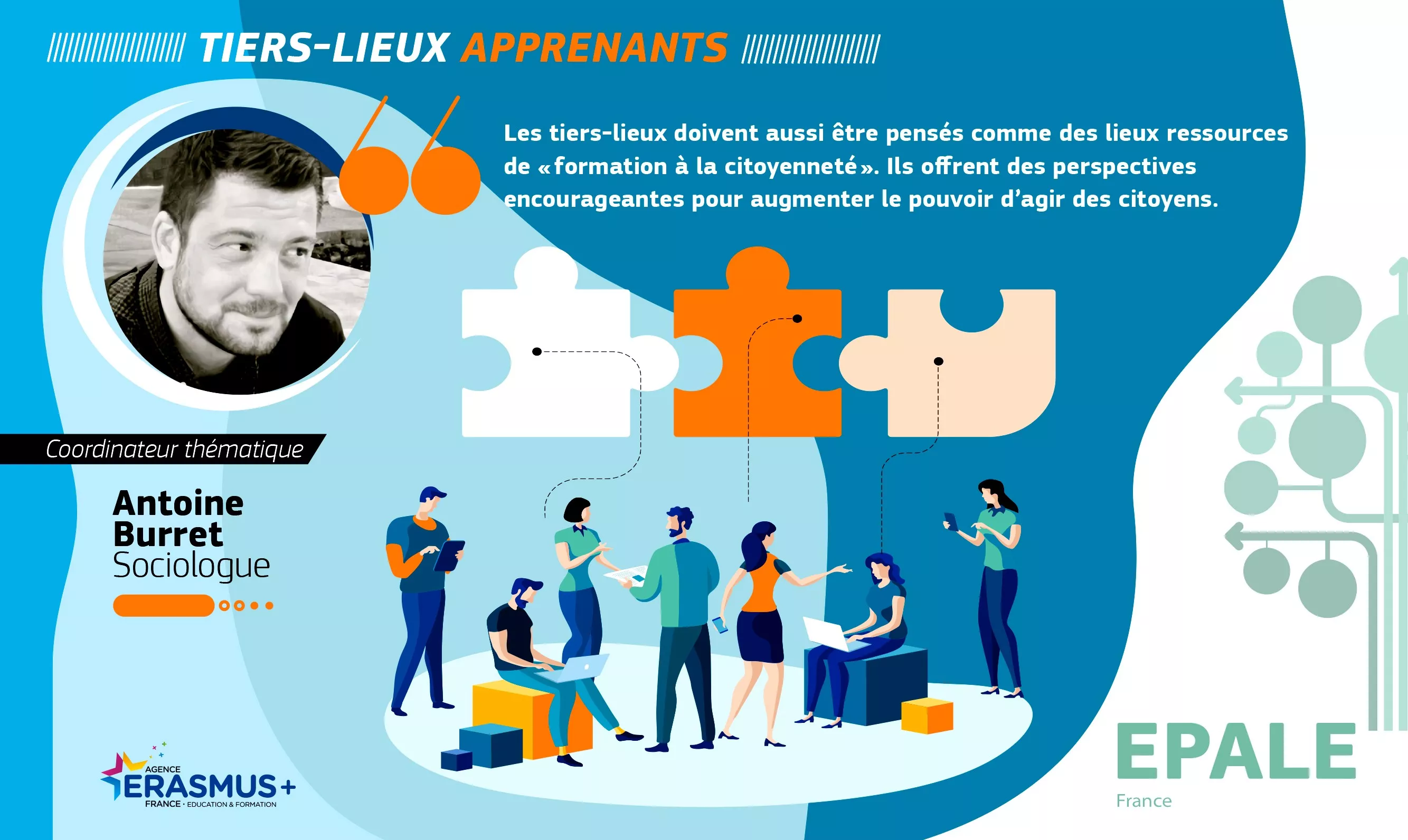Sociologist Antoine Burret talks to EPALE about third places as new learning environments!
How did you come to work on third places?
Antoine Burret: I worked in Romania and Serbia in French Institutes and local associations before doing a Unesco Master's degree in Belgrade (in partnership with the University of Grenoble-Alpes and the University of Lyon) on cultural policies in countries in transition. In 2010, new types of meeting places began to appear in France, such as hacker spaces, fab labs and coworking spaces; all third places where the idea of doing was combined with that of socialising. I then began a thesis in sociology to understand the emergence of these third places in France, Switzerland and Belgium. I worked with the different communities to write the manifesto of third places in 2013, and then in 2015 I published the first book specifically on the subject ("tiers-lieux et plus si affinités") published by FYP Editions. Since then, I have continued my research at the Geneva Institute of Service Science while continuing to launch third places in several countries.
You are working in particular on "third-party places for learning". What does this mean?
Antoine Burret: In general, third places are seen as places where a community can meet and socialise. Nowadays, these places are often embodied by what are known as fab labs, maker spaces or more generally community places that value doing things together.
In the field of education, some authors postulate that extracurricular activities, or the spaces between school and home, are third places for students. Several studies show that these places play a major role during adolescence, in particular. Recent articles show that the impossibility of using third places is one of the major criteria in the suffering experienced by students during the health crisis.
However, when we talk about third-party learning spaces, we are referring to certain meeting places set up within schools and known as fab labs. These are physical locations within the school grounds that are supported by technical, legal and human resources. Their ambitions are multiple: to allow students and teachers to experiment with new practices, to mobilise multidisciplinary skills, to open up to others, to build civic knowledge, to learn to make objects.
What do these places mean for continuing education?
Antoine Burret: Third places are designed to enable exchanges and discussions between different people on a daily basis. More formally, the economic model of many third places is often based on the organisation of training to support a return to work or simply to help each other. I am also thinking of support activities for business creation or, more broadly, mediation and popular education activities. For example, since 2014 the Fondation de France has relied almost exclusively on third places to carry out its programme dedicated to helping people in precarious situations return to work.
In third places, the question of training is also addressed through efforts to transfer knowledge. Many third places work towards documentation and dissemination of their knowledge. Users are encouraged to describe what they make, create or do on knowledge-sharing platforms along the lines of Wikipedia. This is so that the knowledge can be disseminated and others can take advantage of it: everything is disseminated under free licences.
How do you see your mission for EPALE?
Antoine Burret: To begin with, I am going to write a series of articles to give an idea of what third places represent in the field of adult education. I also think it is important to highlight the actors - whether they are third place providers or beneficiaries - to promote the people and their actions: for example the FÉE Association (Faire École Ensemble), or the members of the Tiers-Lieux Edu network.
The issue of third places is highly topical in France. As thematic coordinator for EPALE, I would like to see a real space for discussion and exchange on this subject at European level. I am a great believer in the empowerment offered to citizens by third places and I am delighted to discuss this from a European perspective.
What does this "citizen empowerment" consist of?
Antoine Burret: I think that these places should also be thought of as resource centres for "citizenship training". I would very much like to highlight some of the experiences that are taking place in third places. In particular, a project I am currently following which aims to disseminate forms of citizen investigation kits so that people can design their own health and environmental monitoring devices. The goal is to use third places to teach people to carry out self-diagnosis for cases of diabetes, for example. Or even to monitor the quality of river water or air.
For example, last year, after the Lubrizol fire in Rouen, these third places provided kits and training sessions to some residents so that they could monitor their health environment. This applies to other issues, and offers encouraging prospects for empowering citizens.





